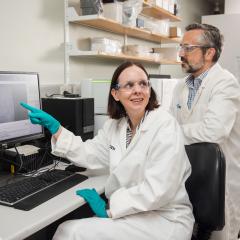A molecular ‘target’ that could lead to a drug to fight leukaemia is in the sights of a team of University of Queensland researchers.
Professor Tom Gonda, from UQ’s School of Pharmacy, said the team had found that the ‘docking’ of one protein, the Myb protein, with another protein, the p300 protein, was essential for the development of acute myeloid leukaemia, one of the deadliest types of leukaemia.
“Our data identifies the critical role of this Myb-p300 interaction and shows that the disruption of this interaction could lead to a potential therapeutic strategy,” he said.
“This finding could lead to our team developing a drug to block this interaction and stop the growth of not only acute myeloid leukaemia cells but probably the cells of other types of leukaemia as well.”
He said the Myb protein was produced by the MYB oncogene, a gene that had the potential to cause cancer and was required for the continued growth of leukaemia cells.
“However, it’s important to note that MYB is also essential for normal blood cell formation so we need an approach for targeting it that won’t completely disrupt normal blood cell production.
“Our research shows that normal blood cells can continue to form even when the Myb-p300 interaction is unable to occur, suggesting that a drug that blocks the interaction could be safe for use in patients.
“This work is at a very early stage and, although a high-risk project, it has the potential to produce large benefits in the fight against leukaemia and, possibly, other cancers.
“Drug development and subsequent clinical trials are long processes but we are hopeful that this research has a promising future.”
Much of the research was done by Dr Diwakar Pattabiraman while he was a PhD student in Professor Gonda’s laboratory.
Professor Gonda said that as Myb was not a conventional target for drugs, the team would also examine other ways to target MYB, such as targeting the genes and proteins that work ‘downstream’ of MYB.
“If we can block the downstream molecules that are controlled by MYB, we may end up with the same result,” he said.
The research was published in the prestigious haematology journal Blood.
MEDIA: Helen Burdon, Faculty of Health and Behavioural Sciences, 07 3365 7436, h.burdon@uq.edu.au, 0412 744 437 or Professor Tom Gonda, 07 3346-1720, 0438 670 400, t.gonda@uq.edu.au


